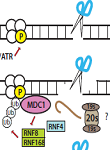|
|
|
Putting the Proteasome at the End: An Emerging Role for the Ubiquitin--Proteasome System
|
|
|
|
|
|
|
|
|
|

|
|
|
Molly C. Kottemann
|
|
|
|
The Rockefeller University
|
The Rockefeller University, New York, NY 10065, United States.
|
|
m.kottemann@rockefeller.edu
|
|
|
|
|
|
|
|
|
|

|
The proteasome is best known for its function in the orderly degradation and turnover of proteins, and in this capacity is important in a wide variety of cellular processes from protein quality control to cell cycle regulation. Mounting evidence suggests that the proteasome is a rational therapeutic target in the treatment of cancer; in clinical trials, proteasome inhibitors have proven effective against hematological malignancies. On a cellular level, proteasome inhibitors sensitize the cell to DNA damage, suggesting a link between the proteasome and DNA repair pathways. The proteasome's involvement in cellular response to UV damage has been well established, but its role in other repair pathways, like homologous recombination, remains comparatively obscure. Here, we review recent research that implicates the proteasome as important in the repair of DNA double stranded breaks.
|
|
|
|
|
|
|
|

|
|